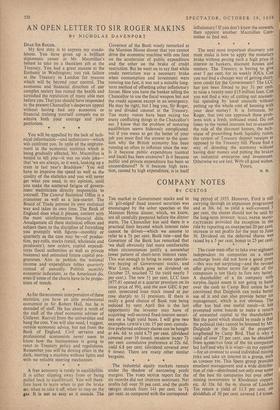AN OPEN LETTER TO SIR ROGER MAKINS
BY NICHOLAS DAVENPORT
DEAR SIR ROGER,
My first duty is to express my condo- lences. You have given up a brilliant diplomatic career at Mr. Macmillan's behest to take on a thankless job at the Treasury. You had a great success at the Embassy in Washington; you risk failure at the Treasury in London for reasons which will be beyond your control. The economic and financial direction of our complex society has ruined the health and tarnished the reputation of many able men before you. That you should have responded to the present Chancellor's desperate appeal without having had any economic or financial training yourself compels me to admire both your courage and your patriotism.
You will be appalled by the lack of tech- nical information—and technicians—which will confront you. In spite of the improve- ment in the economic statistics which is being gradually effected, Mr. Macmillan is bound to tell you—it was no stale joke— that 'we are always, as it were, looking up a train in last year's Bradshaw.' You will have to improve the speed as well as the quality of the statistics and you will never get what you need, in my opinion, until you make the scattered fatigue of govern- ment statisticians directly responsible to yourself. The Central Statistical Office is a misnomer as well as a late-starter. The Board of Trade pursues its own statistical way and takes its own time. The Bank of England does what it pleases, content with the most uninformative financial data. Amalgamate all these statistical offices and subject them to the discipline of furnishing you promptly with figures—monthly or quarterly as the case may be—of produc- tion, pay-rolls, stocks (retail, wholesale and producers'), new orders, capital expendi- tures (local authorities as well as private business) and estimated future capital pro- grammes. Aim to publish the national income and expenditure tables quarterly instead of annually. Publish monthly economic indicators, as the Americans do, even if some of the charts have to be projec- tions of trends.
* * * As for the economic interpretation of these statistics, you have an able professional economist in Sir Robert Hall, but he is denuded of staff. He has about a tenth of the staff of the chief economic adviser of Unilever. Recruit from the universities and hang the cost. You will also need, I suggest, outside economic advice, but not from the Bank of England. Civil servants and professional economists never seem to know how the businessman is going to react to Treasury policy and regulations. Remember you will be driving often in the dark, steering a machine without lights and with no reliable steering mechanism.
* * *
A free economy is rarely in equilibrium. It is either slipping away from or being pulled back to equilibrium. You will there- fore have to learn when to put the brake on, when to take it off, when to step on the gas. It is not so easy as it sounds. The
Governor of the Bank wisely remarked at the Mansion House dinner that you cannot drive the economic machine with one foot on the accelerator of public expenditure and the other on the brake of credit restriction. But he went on to say that while credit restriction was a necessary brake when consumption and investment were running too fast, it was not a suitable long- term method of offsetting other inflationary forces. Here you have the banker telling the Chancellor to use the fiscal weapon but not the credit squeeze except in an emergency. He may be right, but I beg you, Sir Roger, to end divided counsel at the Treasury. Too many voices have been saying too many conflicting things in the Chancellor's ear. I know that the problem of restoring equilibrium seems hideously complicated. but if you mean to get the better of your job you must find the answer to the ques- tion why the British economy has been running so often to inflation since the war. Is it because public expenditure (central and local) has been excessive? Is it because public and private expenditure has been so uncoordinated? Is it because high taxa- tion, caused by high expenditure, is in itself inflationary? If you don't know the answers, then appoint another Macmillan Com- mittee to find out.
• * *
The next most important discovery you must make is how to apply the monetary brake without paying such a high price in interest to bankers, discount houses and rentiers. The Treasury is having to give over 5 per cent. for its weekly IOUs. Can you not find a cheaper way of getting short- term credit for the Government? The LCC has just been forced to pay 51 per cent. to raise a twenty-year £15 million loan. Can you not find a way of cutting out unessen- tial spending by local councils without putting up the whole cost of housing with your dear money? It is fortunate, Sir Roger, that you can approach these prob- lems with a fresh, unbiased mind. Do not listen to the vested interests but re-examine the role of the discount houses, the tech- nique of prescribing bank liquidity ratios, the system of Treasury deposit receipts as opposed to the Treasury bill. Please find a way of directing the economy without having dear money and putting the brakes on industrial enterprise and investment. Otherwise we are lost. With all good wishes.
Yours,
N. D.


































 Previous page
Previous page